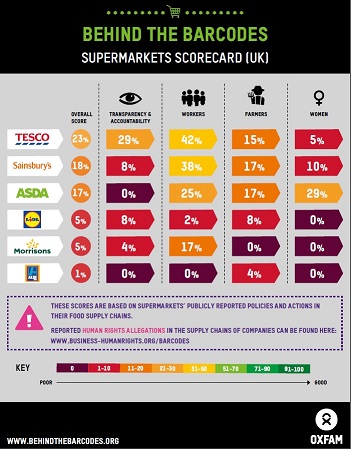Millions of people who produce the food for supermarkets are trapped in poverty and face brutal working conditions, with many going hungry, according to a new report on global supermarket supply chains, published today by Oxfam.
Ripe for Change highlights how supermarkets, including Tesco, Sainsbury’s, Morrisons, Asda, Aldi and Lidl, are increasingly squeezing the price they pay their suppliers with less and less of the price paid at the till reaching the small-scale farmers and workers who produce the food. This, coupled with the weakening influence of small-scale farmers and workers, is causing economic exploitation, suffering, inequality and poverty.
Of the food supply chains analysed, none enabled people to earn enough for even a basic standard of living and in some cases, like Indian tea and Kenyan green beans, it was less than half of what they need to get by. Women face routine discrimination, often providing most of the labour for the lowest wages.
Oxfam and partner organisations also surveyed hundreds of small-scale farmers and workers in supermarket supply chains across five countries and found that many people were struggling to feed themselves and their families. More than nine out of ten grape workers in South Africa and seafood processors in Thailand surveyed – most of whom were women – said they hadn’t had enough to eat in the previous month.
Rachel Cable, Head of Oxfam Cymru said: “It’s shocking that so many of the farmers and workers producing food for our supermarket shelves are going hungry themselves. Our biggest supermarkets are squeezing the price they pay their suppliers, resulting in huge, hidden suffering amongst the women and men who supply our food and trapping them in poverty.”
The analysis found that across twelve common food products, including tea, orange juice and bananas, UK supermarkets receive almost ten times more of the checkout price than the small-scale farmers and workers who produce them. The UK supermarkets’ share rose from 41 percent in 1996 to nearly 53 percent in 2015, whilst the share paid to small-scale farmers and workers in their supply chains fell by a quarter to just 5.7 percent, over the same period.
The report includes a scorecard, based on the assessment of the publicly available policies and reported practices that affect the workers and farmers – especially women – in the food supply chains of some of the biggest supermarkets in the UK, United States, Germany and the Netherlands. Scoring was made against a series of indicators based on robust international standards and widely recognised good practice. The analysis of the six biggest supermarkets in the UK – Tesco, Sainsbury’s, Morrisons, Asda, Aldi and Lidl – indicates a striking gap between their current
policies and what needs to be in place to ensure that human and labour rights are fully respected in their supply chains. The overall scores ranged from just one percent for Aldi to 23 percent for Tesco.
Oxfam and the Sustainable Seafood Alliance Indonesia examined the working conditions in prawn processing plants and exporters in Thailand and Indonesia respectively, which supply some of the biggest supermarkets in world, including the six UK supermarkets. Workers described forced pregnancy tests, unsafe working conditions, poverty wages, strictly controlled bathroom and water breaks, and verbal abuse.
Melati* worked in an Indonesian factory and had to peel 600 prawns in an hour – one every six seconds – but said she could never meet this target. This meant she faced verbal abuse and feared her two month contract wouldn’t be renewed. On top of unattainable targets, conditions in the factory were dangerous. Melati said: “I was given plastic gloves because we ran out of rubber gloves. My hands were burning and I was out of breath. In the evening, I still couldn’t breathe properly.”
Oxfam’s report marks the launch of Behind the Barcodes, a new global campaign urging supermarkets and governments to crack down on inhumane working conditions, increase transparency on where food comes from, tackle discrimination against women, and ensure a larger share of what consumers spend on food reaches the people who produce it.
Spencer said: “Global businesses can help lift millions of people out of poverty, but the food industry currently rewards shareholder wealth over the work of millions of women and men with supermarkets ignoring the hidden suffering behind their food supply chains. When companies get serious about supporting decent work they can help transform lives in some of the poorest parts of the world.”
Ends
Notes to Editors:
Footage and photographs of seafood workers can be accessed here
*Melati is not her real name
The full Ripe for Change report can be accessed here and executive summary can be accessed here
A briefing that puts key findings of Ripe for Change into a UK context – UK Supermarket Supply Chains, Ending the Suffering Behind our Food – can be accessed here
The Ripe for Change methodology note can be accessed here
The UK supermarket scorecard can be accessed online here (it is on page seven of the UK report)
Oxfam’s global scorecard assessment tool analyses global supermarket giants Ahold Delhaize, Albertsons, Aldi North, Aldi South, Costco, Edeka, Jumbo, Kroger, Lidl, Morrisons, Plus, Rewe, Sainsbury’s, Tesco, Walmart, Whole Foods.
